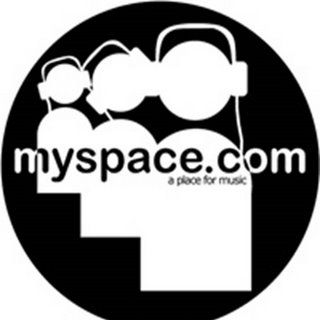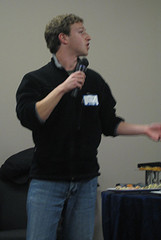The EPIC FAIL of MySpace (and why Facebook is next)
As users of Facebook.com “vote” for a bill of rights and the founders of MySpace.com start turning a foot towards the door, some thoughts about how low-culture and not ‘the nightclub’ analogy is to blame for social networking sites’ downfalls
 There’s an old web adage used by providers of uncouth videos online: “if you find this funny, you’re going to hell. See you there!” This would be a perfect battlecry for what has become of MySpace, as pointed out by Facebook champions who are on the same path. Other analysts are keen on likening a loss in popularity to a nightclub spot that is HOT one month and NOT when something new comes along. But it’s actually the fault of the website operators exploiting and ruining the fun that’s to blame.
There’s an old web adage used by providers of uncouth videos online: “if you find this funny, you’re going to hell. See you there!” This would be a perfect battlecry for what has become of MySpace, as pointed out by Facebook champions who are on the same path. Other analysts are keen on likening a loss in popularity to a nightclub spot that is HOT one month and NOT when something new comes along. But it’s actually the fault of the website operators exploiting and ruining the fun that’s to blame.
At its best, the internet is used to provide information, to entertain or distract, and to connect. As a high culture tool, it disseminates news and ideas. It brings together communities and organizations more efficiently, and, as a neat perk, you can shop for items otherwise only available regionally. As a low culture tool, content is re-purposed, commented on without validation and parodied. Advertising becomes pervasive and marketing is incessant. Online connections fester into something resembling anti-social behavior removed from real life. Plus, many who feel entitled to “a voice” overrun every kind of site with shallow chatter.
When Vannevar Bush was sketching out the inspiration for the first practical computer and hypertext tool called the memex, it is unlikely he could comprehend that it would end up being used by people wanting to show friends “Which Cat Breed should I Be?” It is just as unlikely that English physicist Tim Berners-Lee and Belgian computer scientist Robert Cailliau would know that the web of nodes which would become the World Wide Web would be used by taverns and cafes to promote the day’s specials.
Why the exodus? Quite simply, it is a question of narcissism and a financial model that exploded. Originally started by a marketing company to mimic social networking site Friendster, MySpace is ostensibly set up as a page in which even the undereducated computer user can set up a personal spot and the simulacrum of a full-blown website with simplified applications and tools. Online entrepreneurs working outside of the MySpace realm even provide a cottage industry by providing custom page code, graphic design and functionailty for someone who wants a fancier page.
MySpace, as a social networking concept, isn’t to blame for the current downswing in popularity and public scorn. At its best, the site worked to entitle people to proclaim themselves in a personal, creative style. Control of a page’s content is still structured by the site owners: many third-party apps are banned; nudity is often monitored and excised. One function was added so that pages could only be viewed by those the user authorized (similar to Facebook’s ‘Confirm as a Friend’). Age representation is tightly controlled to prevent exploitation – but obviously not enough, if we are to accept the local TV news. What happened was that MySpace was allowed to grow bigger and bigger until it popped with users.
The login page is cluttered with animated ads for KFC, action movie premieres, music pop star blogs, match.com — ad nauseum indeed. There is a group for everything from comic books to tattoo lovers. Individual pages scream with wild colors, music players, frame knocking applications (most monitor resolutions max at 1024×768, these go to 1600×1200) , and loose associations with famous people or venues which then clutter the comment sections.
 MySpace just isn’t fun anymore, and it seems to reek of consumerism and common-denominator ethics. Personally, I can’t see through the clutter on the pages to get at what I first went there for. Maybe I should not have made friends with Dane Cook, the Suicide Girls, and a dozen local bands in Milwaukee. It takes a few minutes to find any postings from actual friends, and I’m no longer interested in adding to my own page. In fact, a new social directory called “MySpace Local (BETA)” seems to operate as a de facto magazine guide to the city by employing unpaid common voices – and putting me even further out of a journalism job.
MySpace just isn’t fun anymore, and it seems to reek of consumerism and common-denominator ethics. Personally, I can’t see through the clutter on the pages to get at what I first went there for. Maybe I should not have made friends with Dane Cook, the Suicide Girls, and a dozen local bands in Milwaukee. It takes a few minutes to find any postings from actual friends, and I’m no longer interested in adding to my own page. In fact, a new social directory called “MySpace Local (BETA)” seems to operate as a de facto magazine guide to the city by employing unpaid common voices – and putting me even further out of a journalism job.
By contrast, let’s look at the new hot nightclub. Facebook was started in 2003 (two decades in web years) by Mark Zuckerberg while attending Harvard. It would seem that the simple purpose of the now popularized – once available to college students only – form was to keep people in touch about minutiae of friends’ personal lives. The truth is, it was started as a ‘Hot or Not’ rip-off listserv to be used amongst the student population. It grew into something much more useful only in recent years, re-connecting lost friends and largely eliminating the need to contact anyone by phone.

Mark Zuckerberg, photo by Dave McClurg
Zuckerberg has always remained as the leader when the media comes a-knockin’, and he has consistently shied away from buyout offers and third-party overdevelopment like it is George Bailey versus Mr. Potter. Even so, Microsoft and other billionaire parties have found ways to sink their teeth into the operations — without gaining any control.
The site is a fluid and wonderful contraption, but not without flaws, mostly the fault of users for overutilizing it. Logging into the site without any filters or settings can mean that every status update will be sent to your email account. Even with filters in place, some ‘friends’ post announcements so regularly that any diversity of voice is knocked off the front page. Applications meant for fun (Give a cybergift, games, Top 5, quizzes) wallpaper the newsfeed. It’s not the site that’s pushy; the community just overbears it.
On the plus side, the dissemination of links and stories is more visual and useful than the old-school method of sending a link by email. The blue/black font and structure remains clean and tightly controlled. Ads are present, but run only along the right side and are kept tasteful. Nobody complains that the site should do more, except perhaps that Facebook should give authorship controls to users (see the argument of Terms of Service as mentioned earlier). The progress and evolution remains a curve.
But for how long? It seems inevitable that someone will sell out to someone who will aim to low-culture for big bucks. Why eat a fancy yellow cake with frosting when you can get an individually wrapped cake piece with the frosting inside and a cake cowboy on the front cover? It would appear that the developers of the internet are clever and engaging, while the businessmen of the internet think offering every widget and scrap of content under the sun will bring users constantly to a site.






















Actually, there isn’t any facebook setting that sends every friends’ status updates to your email account. It’s only you-specific actions that bring you alerts.
This article kind of reads like yet another “I don’t get it, so I hate it,” kind of post. It’s like the people who are already decrying Twitter as “over” when it’s barely just begun to become widespread.
“It’s not the site that’s pushy; the community is just overbears it.”
While this sentence is incredibly confusing, I think that your ability to “control” not only who is a member of your community, but what items you see/receive from those members is what makes Facebook wonderful. There isn’t a well-structured alternative in sight, and I think it’s here to stay for awhile.
“It would appear that the developers of the internet are clever and engaging, while the businessmen of the internet think offering every widget and scrap of content under the sun will bring users constantly to a site.”
I think this sentence was especially amusing, when considered it was posted above one of the largest collections of widgets I’ve ever seen on a site that offers non-stop blog feeds and add-ons. 😉
Responding to Davis:
Davis: “Actually, there isn’t any facebook setting that sends every friends’ status updates to your email account. It’s only you-specific actions that bring you alerts.”
Me: When you first join Facebook, and you don’t adjust any settings, the default tendencies is to send you an email notice whenever someone comments on your status, sends a gift, etc.
Davis: “While this sentence is incredibly confusing, I think that your ability to “control” not only who is a member of your community, but what items you see/receive from those members is what makes Facebook wonderful.”
Me: Yes, that sentence was amazingly atrocious, and the result of a missed edit. The word ‘is’ has been excised and it should be clear. And yes, facebook is wonderful. Currently it’s the users (our “friends” and outside developers) which are starting to make it silly and engorged.
Davis: This article kind of reads like yet another “I don’t get it, so I hate it,” kind of post.
Me: I get it, I love it. I don’t want to see it fail. But the pattern of internet dot.coms is to become hugely popular and then suffer a downfall and shunning. People may want to blame low culture, but its the users and advertisers marketing them which kill the fun.
Lo del mando me parece muy bueno, quiero uno ya!